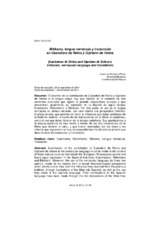Biblismo, lengua vernácula y traducción en Casiodoro de Reina y Cipriano de Valera
Casiodoro de Reina and Cipriano de Valera’s biblicism, vernacular language and translation
Autor
Monreal Pérez, Juan Luis
Editor
UCOPressFecha
2014Materia
ErasmismoReformismo
Biblismo
Lengua Vernácula
Traslación
Erasmianism
Reformism
Biblicism
Vernacular Language
Translation
METS:
Mostrar el registro METSPREMIS:
Mostrar el registro PREMISMetadatos
Mostrar el registro completo del ítemResumen
El examen de la contribución de Casiodoro de Reina y Cipriano de Valera a la lengua vulgar hay que hacerlo en el contexto de tres corrientes culturales que agitan el periodo renacentista europeo y que encuentran, igualmente, su expresión en la España de aquel tiempo: Erasmismo, Reformismo y Biblismo. Por otra parte, el uso de la lengua vernácula en ambos necesita ser visto desde una perspectiva históricolingüista amplia, que permita ver tanto la influencia que éstos recibieron de la tradición anterior, a través de las traducciones de la Biblia al castellano, como el uso que éstos hicieron de la lengua castellana. Sus aportaciones a la lengua española se han hecho a través de las dos traslaciones de la Biblia que llevaron a cabo, y que fueron realizadas con las ideas y los criterios que expusieron en sus correspondientes introducciones al texto que denominaron Amonestación y Exhortación Examination of the contribution of Casiodoro de Reina and Cipriano de Valera to the vernacular language must be made in the context of three cultural currents that shook the European Renaissance period and found equal expression in the Spain of that time: Erasmianism, Reformism and Biblicism. Moreover, the use of the vernacular language by these two authors needs to be viewed from a broad historical-linguist perspective which allows one to view both the influence they received from the previous tradition, through translations of the Bible into Spanish, as well as the use they made of the Spanish language. Their contributions to the Spanish language have been made through the two translations of the Bible they made, and which were accomplished with the ideas and criteria presented in their respective introductions to the text named Amonestación y Exhortación.

